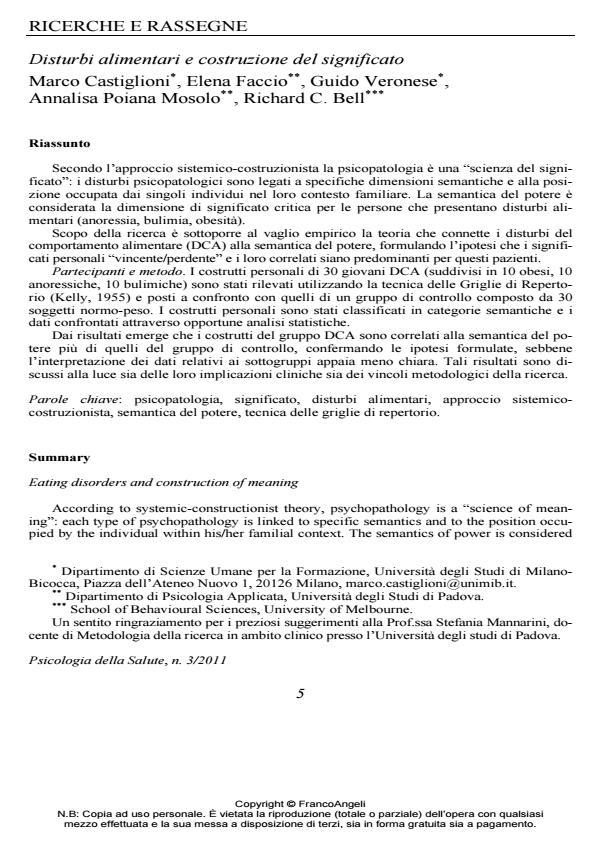Eating disorders and construction of meaning
Journal title PSICOLOGIA DELLA SALUTE
Author/s Marco Castiglioni, Elena Faccio, Guido Veronese, Annalisa Poiana Mosolo, Richard C. Bell
Publishing Year 2011 Issue 2011/3
Language Italian Pages 24 P. 5-28 File size 275 KB
DOI 10.3280/PDS2011-003001
DOI is like a bar code for intellectual property: to have more infomation
click here
Below, you can see the article first page
If you want to buy this article in PDF format, you can do it, following the instructions to buy download credits

FrancoAngeli is member of Publishers International Linking Association, Inc (PILA), a not-for-profit association which run the CrossRef service enabling links to and from online scholarly content.
According to systemic-constructionist theory, psychopathology is a "science of meaning": each type of psychopathology is linked to specific semantics and to the position occupied by the individual within his/her familial context. The semantics of power is considered to be the most critical dimension of meaning for people suffering from eating disorders (anorexia, bulimia and obesity). This study aimed to empirically test the theory that eating disorders are psychologically linked to the semantics of power. The hypothesis was that personal meanings of "winner/loser" and associated meanings are predominant for people suffering from eating disorders. Participants and method. The Repertory Grid Technique (Kelly, 1955) was carried out with 30 young subjects suffering from eating disorders (divided into 3 subgroups: 10 obese/overweight; 10 anorexic; 10 bulimic patients), to elicit their most significant personal constructs. A sample of 30 normal-weight people was used as a control group. Participants’ constructs were grouped into semantic categories and the data compared using proper statistical analysis. Results: The constructs of the Eating Disorder Group were found to be significantly more connected to the semantics of power than those of the Control Group. The empirical data confirm the hypothesis, although the interpretation of the results regarding subgroups seems to be less clear. These results are discussed in the light of their clinical implications and of methodological limitations of the study.
Keywords: Psychopathology, meaning, eating disorders, systemic-constructionist theory, semantics of power, repertory grid technique
- Food Neophobia or Distrust of Novelties? Exploring Consumers’ Attitudes toward GMOs, Insects and Cultured Meat Elena Faccio, Lucrezia Guiotto Nai Fovino, in Applied Sciences /2019 pp.4440
DOI: 10.3390/app9204440
Marco Castiglioni, Elena Faccio, Guido Veronese, Annalisa Poiana Mosolo, Richard C. Bell, Disturbi alimentari e costruzione del significato in "PSICOLOGIA DELLA SALUTE" 3/2011, pp 5-28, DOI: 10.3280/PDS2011-003001